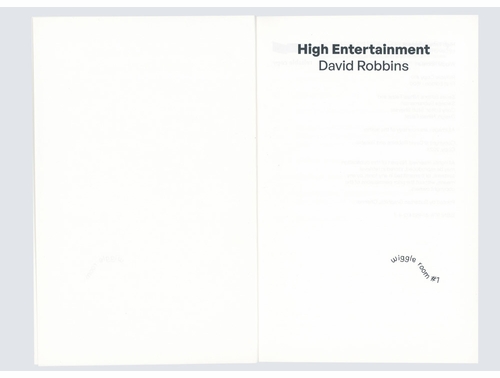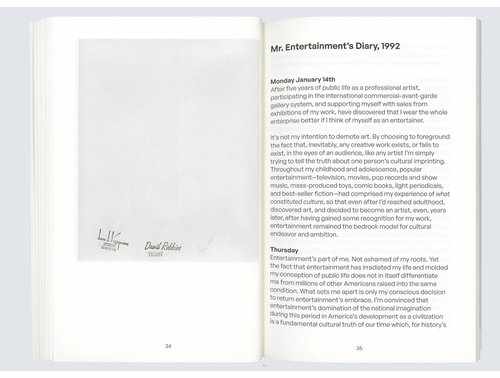ARTBOOK BLOGEventsStore NewsMuseum Stores of the MonthNew Title ReleasesStaff PicksImage GalleryBooks in the MediaExcerpts & EssaysArtbook InterviewsEx LibrisAt First SightThe Artbook 2023 Gift GuidesArtbook Featured Image ArchiveArtbook D.A.P. Events ArchiveDATE 8/20/2024 Heads up on 4/20!DATE 4/30/2024 Danny Lyon at Photobook AustinDATE 4/30/2024 Rizzoli Bookstore presents Roger A. Deakins with James Ellis Deakins and Matthew Heineman on 'Byways'DATE 4/25/2024 Join us at Printed Matter's NYABF 2024!DATE 4/25/2024 The Strand presents Joshua Charow in conversation with Wendy Goodman for the launch of 'Loft Law'DATE 4/24/2024 Bungee Space presents Set Margins’ 6-Book Launch and Get TogetherDATE 4/21/2024 Time & Space Limited presents "Memory as Various: Bernadette Mayer's 'Memory'"DATE 4/18/2024 Howl! Arts/Howl! Archive presents Pyramid Pioneers with 'We Started a Nightclub' signingDATE 4/18/2024 A birthright and a legacy in Ivan McClellan's 'Eight Seconds: Black Rodeo Culture'DATE 4/14/2024 Vintage 'Audio Erotica' from Jonny TrunkDATE 4/13/2024 Unnameable Books presents "Reading from Bernadette Mayer's 'Memory'"DATE 4/13/2024 Artbook at Hauser & Wirth presents Heather McCalden and Cyrus Dunham launching 'The Observable Universe: An Investigation'DATE 4/12/2024 Join Artbook | D.A.P. at Shoppe Object at High Point | EVENTSCORY REYNOLDS | DATE 3/14/2024David Robbins talks to Andrew Swant about 'High Entertainment'On the occasion of his eighth book, High Entertainment, published by Reliable Copy, a Bangalore-based, artist-led publishing house, artist and writer David Robbins answers questions lobbed by Milwaukee filmmaker Andrew Swant. The two discuss Robbins’s concept of High Entertainment, a synthesis developed in writings and artworks across three decades.   ABOVE: Detail from “Talent,” 1986, a suite of eighteen headshot photographs of contemporary artists. Does high entertainment have a particular look or style? No. It’s an attitude toward communication and audience. And a self-conception. I’ve always been more interested in the artist than in art. The role of the artist has been my material from the first. How can we stretch it? What is the artist’s role today, when art is a branch of the entertainment-industrial complex? So are all artists supposed to go into show biz now? They’re enrolled in it from their first exhibition! Business civilization positions art as entertainment — intellectual showbiz, material-culture showbiz, entertainment for another audience and another wallet than popular culture’s. Historically, artists have engaged entertainment, as subject matter, critically or mockingly. We’re not in that era anymore. We’ve got different tools. Today entertainment, as subject, as vehicle, as pleasurable transaction, can be explored directly by independent-minded people who are beholden to neither art’s value system nor the entertainment industry’s. We’ve never had this kind of production-and-distribution technology at our disposal. Now that we have the opportunity, let’s see what we can invent. What if the artist stops denying art’s function as a kind of entertainment? How does the admission alter the artist’s cultural location? We have much to learn about entertainment. What is entertainment? What is it for? It’s “to entertain,” of course, but what goes on in that transaction? And how might we stretch and shape it? Entertainment research is the order of the day! Are you an “artist” or a one-man entertainment production company? The idea of high entertainment proposes a completely different model of the artist than is pervasive today. But that’s a good thing. The art context is today thoroughly compromised by capitalism. Thankfully, we have options to operating ironically and in Broodthaers’s “bad faith.”  Our era has so many serious problems. Do you ever feel irresponsible promoting entertainment? Of course. Do I strike you as a simpleton? But artists embody complex coordinates. Crises don’t obviate the exploration of all other sides of life. They never have. The first world war rages and Malevich paints squares! |





